The Role of Generative AI in the Legal Industry
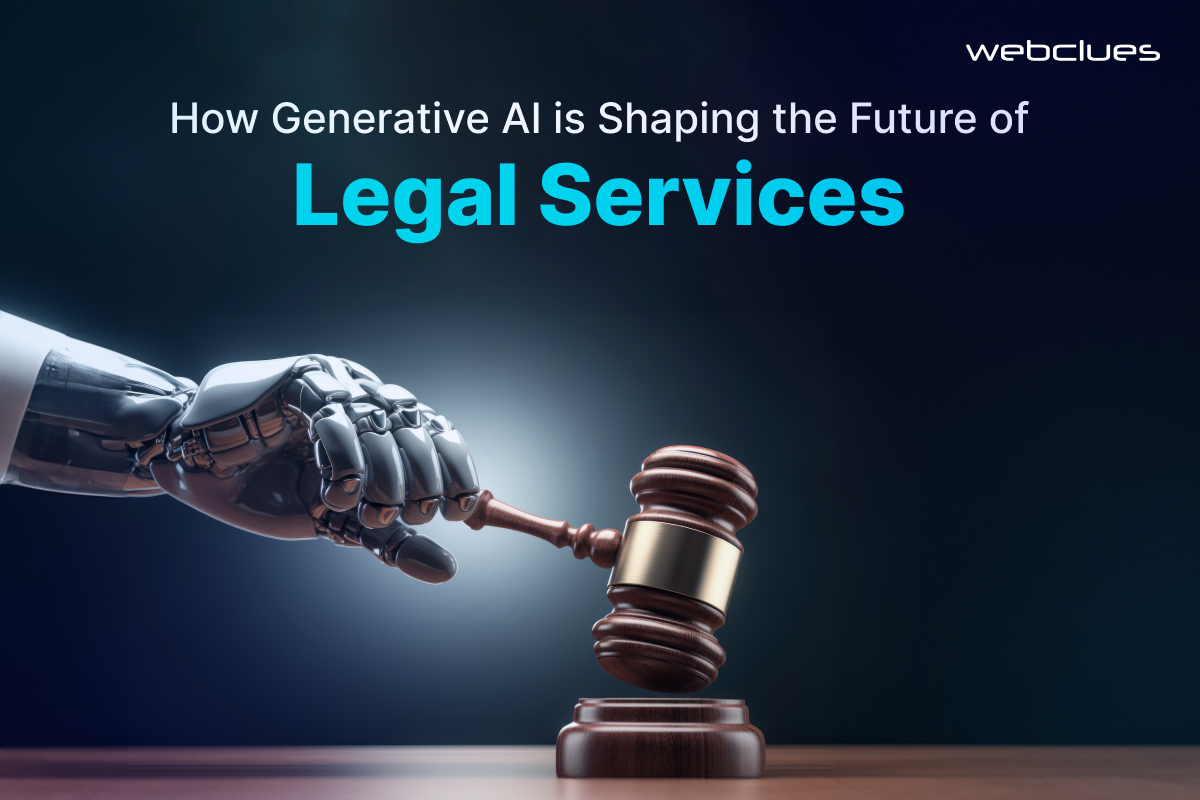
The legal profession has long been known for its careful attention to detail and a strong commitment to upholding the law. Traditionally, this has meant a reliance on manual processes, with lawyers spending countless hours researching precedents, drafting documents, and reviewing contracts. While this dedication ensures accuracy and upholds the highest standards, it can also lead to inefficiencies and limit accessibility to legal services.
However, generative AI is bringing about a revolutionary change in the legal industry. For the curious minds seeking answers to the question - what is generative AI, it refers to a class of artificial intelligence that can create entirely new text, data, visuals, or code. In the context of law, it translates to automating tasks, improving research capabilities, and even assisting in complex legal tasks like contract drafting. As per a recent report, the generative AI market in the legal industry is set to grow to approximately $677.6 million by 2033. The compound annual growth rate (CAGR) of this growth is projected to be 31.5% from 2023 to 2032.
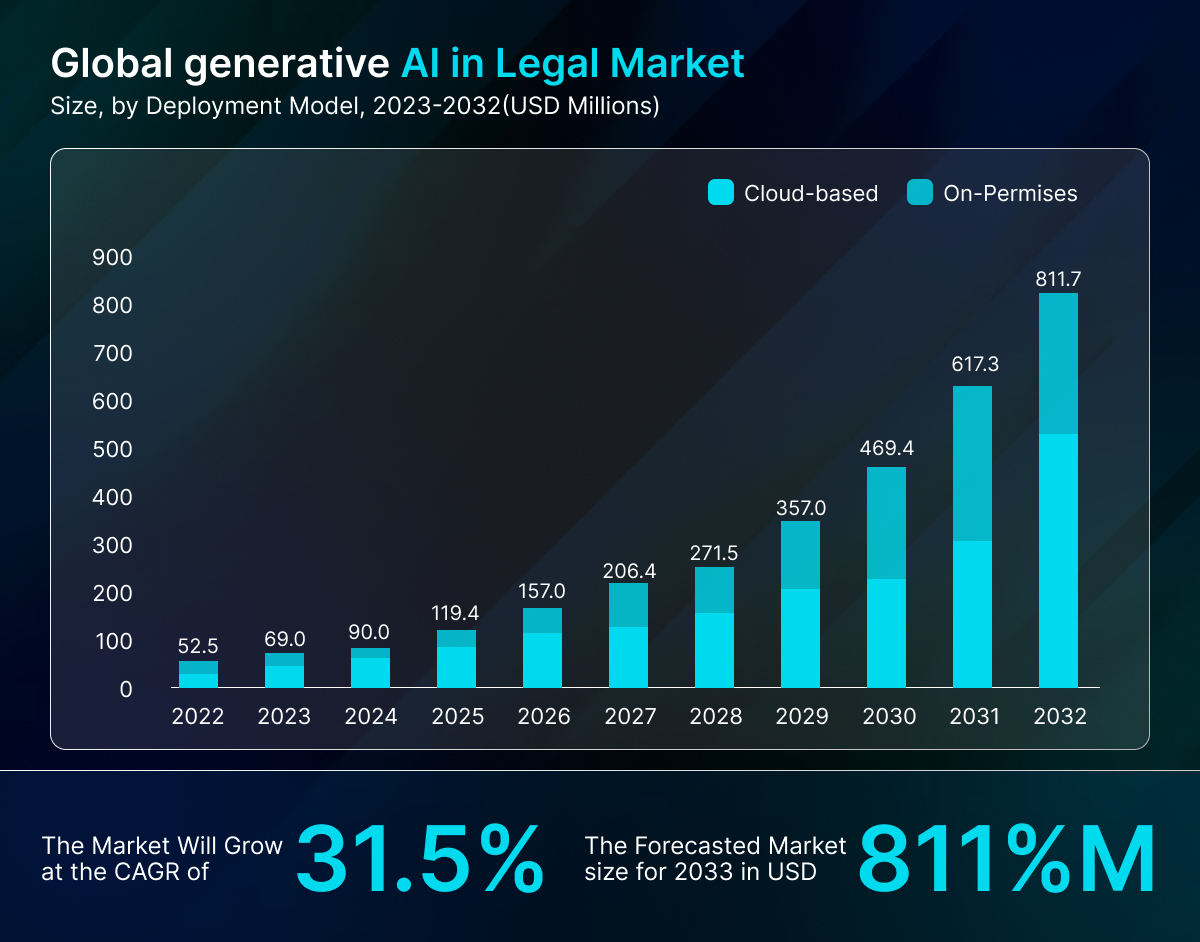
This highlights the significant potential of gen AI to transform the legal industry. Generative AI in the legal industry is set to optimize workflows, improve accuracy, and ultimately make legal services more accessible to a broader audience.
Understanding Generative AI for Law
Traditional AI used in legal practices often focuses on analyzing existing data to identify patterns and trends. Generative AI, on the other hand, helps not only retrieve relevant information but also create new documents, summarize complex legal matters, and even generate different variations of legal text.
At the core of the generative AI technology is machine learning. Generative AI systems are trained on extensive datasets (a vast library of legal documents like contracts, case law, and legal codes), which allows them to learn the intricacies of legal language and the structure of legal documents. Through this learning process, generative AI can identify patterns as well as use them to generate human-like quality text formats, such as drafting clauses in a contract or summarizing key points from a legal ruling.
This ability to generate text is facilitated by Natural Language Processing (NLP). NLP is a subfield of AI that allows the system to analyze legal jargon as well as generate text that is grammatically sound, legally accurate, and stylistically appropriate for the specific legal situation.
This way, generative AI in law utilizes the vast knowledge base of legal documents to automate tasks, generate useful legal outputs, and ultimately help lawyers focus on the more strategic aspects of their work.
Prominent Use Cases of Generative AI in the Legal Industry
Generative AI is set to reinvent the way law firms operate, offering a suite of tools that can optimize workflows, improve accuracy, and enhance the services offered to clients. Here’s a sneak peek into some of the most prominent applications of generative AI in the legal industry.
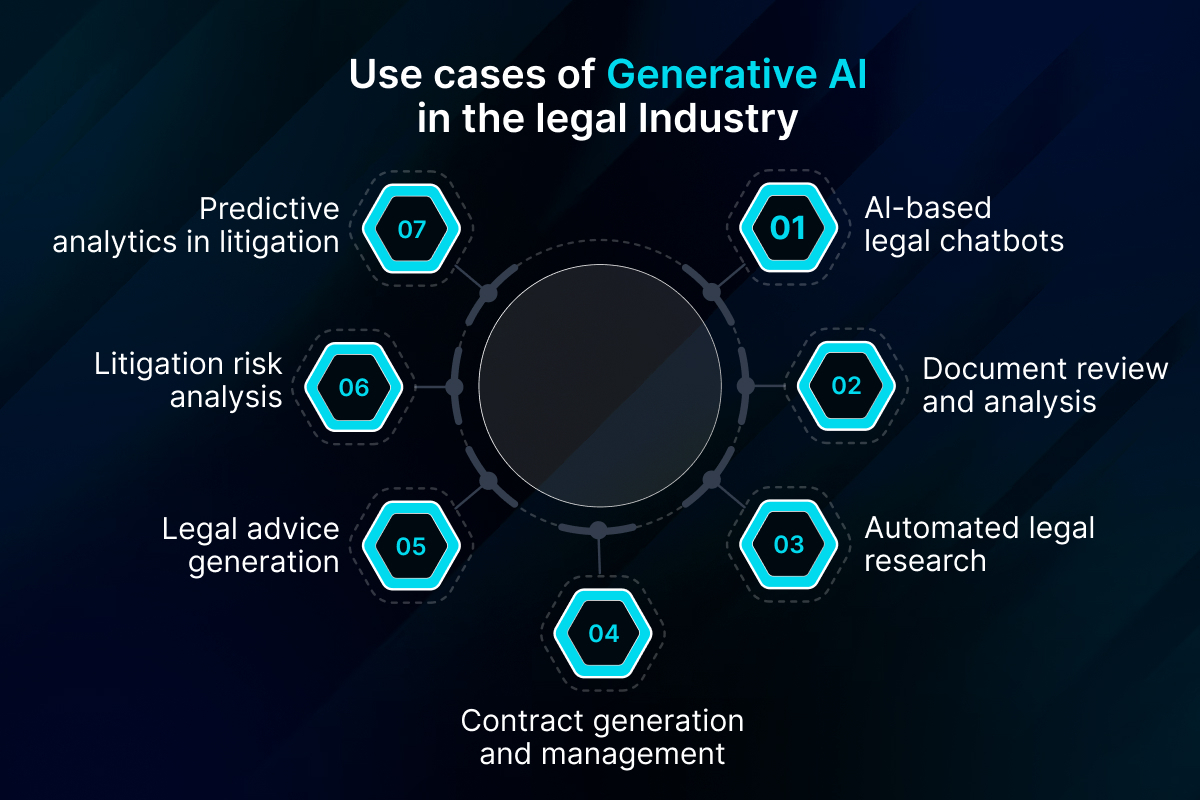
- Automated Legal Research & Due Diligence
Legal research is a time-consuming and laborious task. Generative AI can drastically improve this process by analyzing extensive amounts of legal data, including case law, statutes, and regulations. Advanced NLP capabilities allow generative AI systems to understand the context of a legal query and identify the most relevant legal precedents with pinpoint accuracy. This automation frees lawyers from spending an endless amount of time winnowing through documents, allowing them to focus on analyzing the findings and applying their legal expertise to develop stronger arguments.
- Optimized Contract Management & Drafting
Creating and reviewing contracts is another area ripe for generative AI integration. Gen AI systems can generate first drafts of contracts based on pre-defined templates and specific client needs. This not only saves lawyers significant time but also ensures consistency and reduces the risk of errors. Additionally, generative AI can analyze contracts to highlight potential risks and suggest improvements, ensuring that contracts are comprehensive and protect the best interests of the client.
- Predictive Analytics in Litigation
Litigation is an inherently complex and often unpredictable process. Generative AI can utilize its data analysis capabilities to analyze historical case data and legal precedents. By identifying patterns and trends, generative AI can predict the potential outcomes of lawsuits with greater accuracy. This information allows lawyers to develop more informed litigation strategies, improve negotiation tactics, and thereby achieve better outcomes for their clients.
- Increased Efficiency & Cost Savings
Many legal tasks involve repetitive and time-consuming processes, such as document review and due diligence. Generative AI can automate these tasks with impressive efficiency. AI-powered tools can analyze large volumes of documents, extract key information, and flag potential issues, freeing up lawyers to focus on more strategic aspects of their work. This automation leads to significant cost savings for law firms, allowing them to offer more competitive rates to their clients.
- Litigation Risk Analysis
Generative AI can be used to analyze historical litigation data and identify factors that contribute to successful outcomes. This information can be used to assess the strengths and weaknesses of a client’s case and predict the potential risks associated with litigation. This allows lawyers to advise their clients on the best course of action, be it pursuing litigation, seeking an out-of-court settlement, or avoiding litigation altogether.
- Legal Advice Generation
While generative AI cannot replace the expertise of a lawyer, it can be used to generate basic legal advice on specific legal issues. This can be particularly valuable for clients with limited resources who may not be able to afford expensive legal consultations. AI-powered chatbots can provide initial guidance, answer frequently asked questions, and help direct clients to the appropriate legal resources.
- Document Review and Analysis
As mentioned earlier, generative AI is quite efficient in analyzing large volumes of documents. This is especially beneficial for tasks like contract review, due diligence, and regulatory compliance. Generative AI systems can identify key clauses, highlight potential risks, and pinpoint inconsistencies within documents, saving lawyers significant time and ensuring a more thorough review process.
- AI-based Legal Chatbots
These chatbots can be deployed on law firm websites or mobile apps to provide basic legal information and answer frequently asked questions 24/7. This improves client accessibility to legal resources as well as frees up lawyers from handling routine inquiries, allowing them to focus on more complex legal matters.
Benefits of Generative AI Adoption for Law Firms
The integration of generative AI offers a compelling case for law firms that seek to optimize their operations and improve their service offerings. Here’s a closer look at some key benefits.
1. Increased Efficiency & Productivity
One of the most prominent advantages of generative AI for law firms is automating repetitive tasks that traditionally consume significant lawyer time. Document review, contract analysis, and legal research can all be significantly optimized with the help of AI-powered tools. This frees up lawyers to dedicate their expertise to more strategic tasks, such as developing case strategies, client counseling, and complex legal analysis. By automating these administrative burdens, generative AI helps lawyers maximize their billable hours and achieve a higher level of productivity.
2. Improved Cost Management
The time saved through generative AI automation leads directly to cost savings for law firms. By optimizing workflows and minimizing human error in repetitive tasks, generative AI can significantly reduce the time and resources required to complete legal work. This allows firms to offer more competitive rates to clients or develop alternative fee structures that better reflect the value delivered. This way, generative AI can improve the financial health of law firms and make legal services more accessible to a broader range of clients.
3. Improved Client Service
Clients today expect prompt and efficient service. Generative AI can significantly improve turnaround times for legal tasks and thus ensure that clients receive timely updates and responses to their inquiries. Additionally, AI-powered tools can analyze huge amounts of legal data to provide insightful recommendations and identify potential risks associated with a client’s case. This deeper understanding allows lawyers to provide more comprehensive and strategic legal advice, leading to stronger client relationships and enhanced trust.
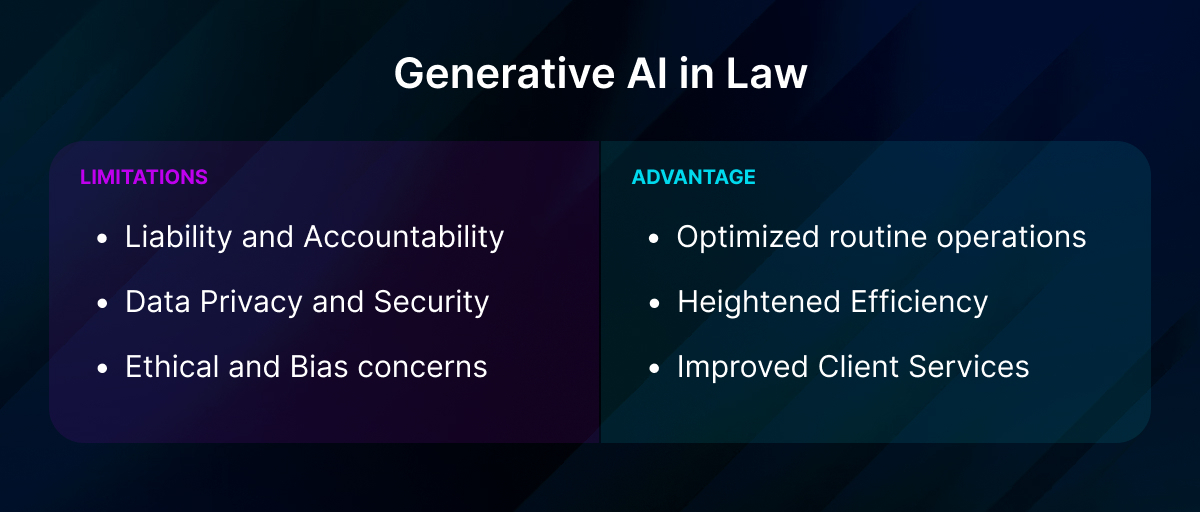
Challenges and Considerations
While generative AI offers an exciting opportunity for the legal industry, it’s essential to acknowledge the challenges and considerations that come with its adoption.
1, Data Bias and Accuracy
AI models are only as good as the data they're trained on. If the legal data sets used to train generative AI systems contain biases, these biases can be reflected in the AI's outputs. For example, if a dataset primarily consists of cases involving male defendants, the AI may be less accurate in predicting outcomes for female defendants. To address this challenge, legal professionals need to be vigilant about using diverse and representative datasets to train generative AI models. Additionally, ongoing monitoring and human oversight are essential to ensure that generative AI outputs are accurate and unbiased.
2. Ethical Implications and Transparency
The use of AI in legal processes raises important ethical considerations. For instance, the opaque nature of some AI algorithms can make it difficult to understand how they arrive at certain conclusions. This lack of transparency can raise concerns about accountability and fairness. To address these concerns, it’s vital to ensure transparency in generative AI-powered legal tools. Lawyers and clients should be able to understand how AI is being used and the reasoning behind its recommendations. Furthermore, human oversight remains crucial throughout the legal process, ensuring ethical decision-making and compliance with legal regulations.
3. The Future of Legal Jobs
The onset of generative AI will undoubtedly reshape the legal workforce. While some repetitive tasks will likely be automated, generative AI is not a replacement for lawyers. However, the skillsets required for success in the legal field are likely to evolve. Lawyers of the future will need to develop expertise in working alongside AI tools, interpreting AI-generated data, and utilizing generative AI to improve their legal strategies. Moreover, strong analytical skills and the ability to communicate complex legal concepts effectively will remain crucial for success.
The Future of Law is Generative
With the continued advancement of generative AI, it is having a significant impact on the future of the legal industry. The influence will become even more profound as the technology matures. Integrating generative AI offers law firms a unique opportunity to optimize workflows, uplift client service offerings, and manage the complexities of the legal industry more effectively. It can prove to be a valuable tool using which lawyers can build up on their own capabilities as well as redefine the future of legal services for the better.
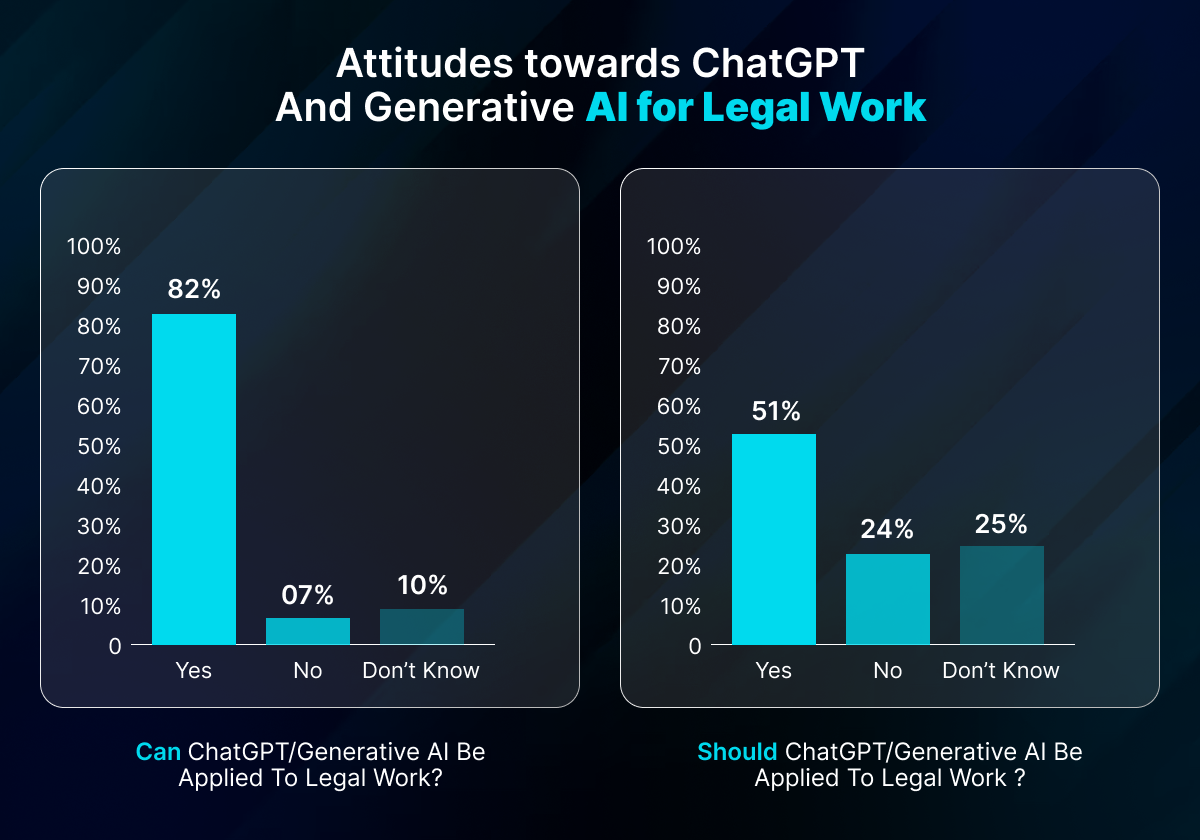
If you’re looking to integrate generative AI into your law firm process, at Webclues Infotech we can help. We offer a suite of comprehensive generative AI solutions specifically designed for the legal industry. Contact us today to learn more about how generative AI can enhance your legal practice and help you succeed.
Build Your Agile Team
Hire Skilled Developer From Us
Generative AI in the Legal Industry
Reinvent your law firm processes with advanced generative AI integration. Generative is set to redefine the legal industry. At WebClues, with our comprehensive suite of generative AI solutions, we can help you tap into this revolutionary technology and take your firm to new heights of success.
Connect Now!Our Recent Blogs
Sharing knowledge helps us grow, stay motivated and stay on-track with frontier technological and design concepts. Developers and business innovators, customers and employees - our events are all about you.
Contact Information
Let’s Transform Your Idea into Reality - Get in Touch
India
Ahmedabad
1007-1010, Signature-1,
S.G.Highway, Makarba,
Ahmedabad, Gujarat - 380051
Rajkot
1308 - The Spire, 150 Feet Ring Rd,
Manharpura 1, Madhapar, Rajkot, Gujarat - 360007
UAE
Dubai
Dubai Silicon Oasis, DDP,
Building A1, Dubai, UAE
USA
Delaware
8 The Green, Dover DE, 19901, USA
New Jersey
513 Baldwin Ave, Jersey City,
NJ 07306, USA
California
4701 Patrick Henry Dr. Building
26 Santa Clara, California 95054
Australia
Queensland
120 Highgate Street, Coopers Plains, Brisbane, Queensland 4108
UK
London
85 Great Portland Street, First
Floor, London, W1W 7LT
Canada
Burlington
5096 South Service Rd,
ON Burlington, L7l 4X4





